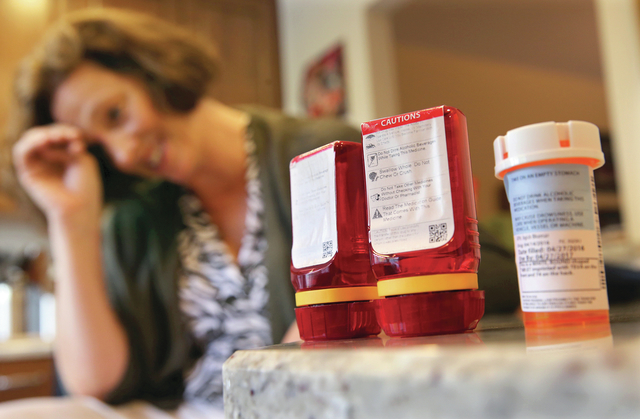Longtime customers of Target’s pharmacies are finding a change in pill bottle design hard to swallow. ADVERTISING Longtime customers of Target’s pharmacies are finding a change in pill bottle design hard to swallow. After CVS began operating Target’s drugstores earlier
Longtime customers of Target’s pharmacies are finding a change in pill bottle design hard to swallow.
After CVS began operating Target’s drugstores earlier this year, distraught customers have been asking — in some cases begging — the drugstore chain to bring back the retailer’s red prescription bottles, which came with color-coded rings, labeling on the top and prescription information that was easier to read.
Some customers also took more drastic steps.
Vivian Ruth Sawyer went fishing through her trash to rescue the old Target bottles soon after opening her stapled prescription bag to find the dowdy, white-capped amber vials that are common in most medicine cabinets. She has since poured refills of her thyroid medicine into the old Target bottles, even though they don’t have the right expiration dates. It’s worth it, she said, because those bottles make it easier to tell her prescriptions apart when she looks in her drawer for them.
“This is really inconvenient and irritating,” the Louisville, Kentucky, resident said.
CVS says it is working on designing a new system for dispensing prescriptions and helping people stay on their medications, but spokeswoman Carolyn Castel declined to share details or say whether that might involve an updated bottle design.
Meanwhile, shoppers continue to mourn the loss of a bottle that was considered groundbreaking when it debuted about a decade ago and was once on display at New York’s Museum of Modern Art.
Target flipped bottle design on its head in 2005 when it introduced a red container with the opening on the bottom. That allowed the label to wrap around the top so it could be seen from above. It included a flat surface that customers found easier to read than the curve of a typical pill bottle, and it came with color-coded rings for the neck to help family members quickly tell their medicines apart.
Deborah Adler devised the new approach as part of her master’s thesis at New York’s School of Visual Arts. She was inspired to try something different after her grandmother mistakenly took her grandfather’s prescription. Adler now runs her own design business and is working with CVS on its new prescription system.
The red bottles were important to Christina Mihalek, of Cincinnati, because she accidentally took her mom’s high blood pressure medicine instead of an antibiotic when she was in high school, and she passed out in the lunch line that day. Mihalek took to Twitter to voice her displeasure, telling CVS in a post with the hashtag #redbottlesrock that “perfection was at your fingertips.”
Shelley Ewalt of Princeton, New Jersey, also tweeted to the drugstore chain, asking if there was any chance they might return to the “vastly superior design” of the Target bottles, which she found easier to open.
Woonsocket, Rhode Island-based CVS Health Corp., which runs the nation’s second-largest drugstore chain, started operating Target pharmacies earlier this year as part of a $1.9 billion deal the companies announced in 2015.
CVS’s Castel said the company stopped using Minneapolis-based Target Corp.’s bottles because it’s more efficient to fill prescriptions with the same bottle at all of its 9,600 pharmacies.
Customer visits to Target’s in-store pharmacies slipped in the second quarter. Castel said CVS doesn’t see a connection between that and the change in prescription bottles.
But the bottle switch might have influenced a small percentage of customers to shop elsewhere, according to Marshal Cohen, chief retail analyst with market researcher NPD Group. He said the second quarter was tough for many retailers, but he also noted that regular customers to pharmacies don’t like change.
“When you start tinkering with things … the consumer kind of gets a little testy,” he said.
Patients can buy prescription bottle caps that glow or beep when it’s time to take their medicine. But Purdue University pharmacy professor Alan Zillich hasn’t seen much of an evolution in the design of pill containers used by pharmacies because it just isn’t worth it, financially.
“Even though drugs cost a lot, pharmacies don’t make much off each individual prescription,” he said.
Sawyer still holds out hope that any new system CVS adopts might include features from the old Target bottles to replace the amber bottles, which she describes as a “ghastly” leftover from the 1950s.
“Everyone else uses the same stupid bottle,” she said.



